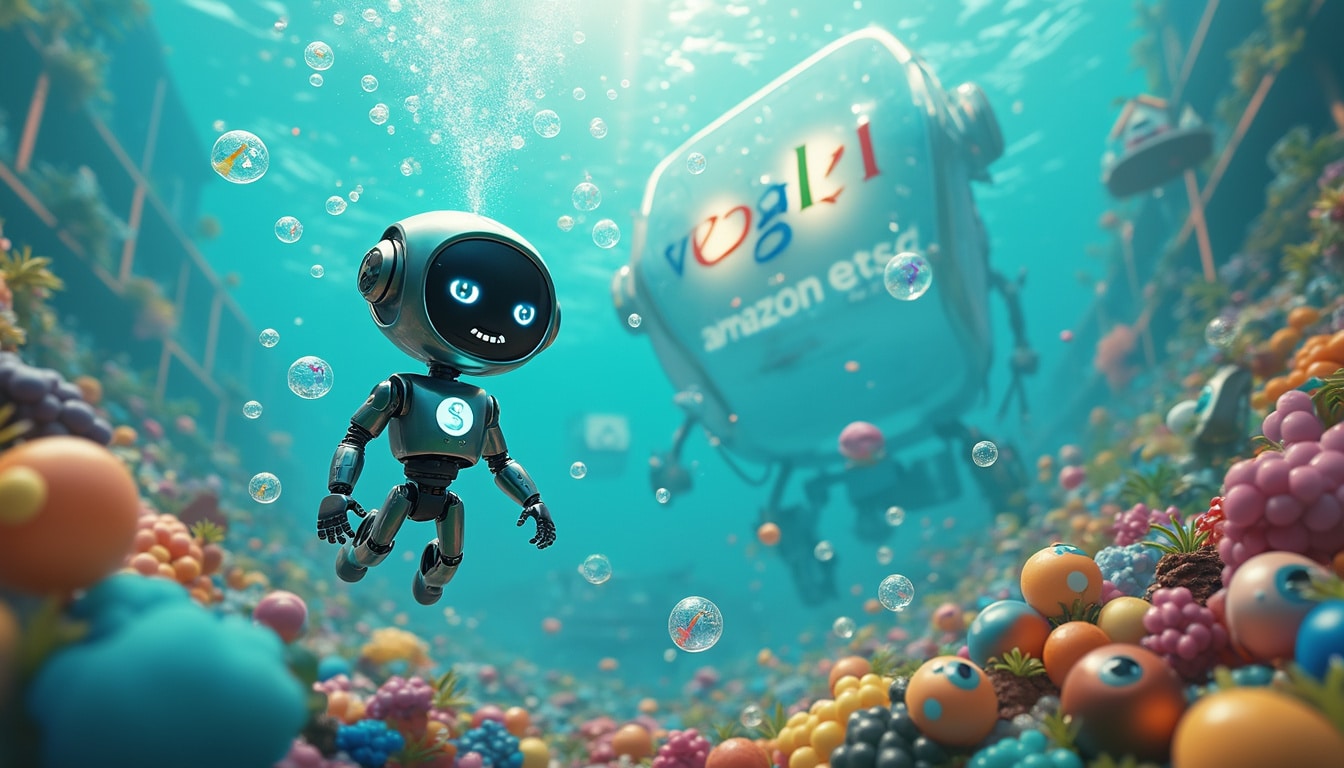Silicon Valley is witnessing a seismic shift in the AI landscape.Former OpenAI talents are launching startups with billion-dollar valuations.These visionaries are reshaping the future of artificial intelligence without even releasing a product.
The echoes of the legendary « PayPal Mafia » resonate as these innovators, once instrumental in the creation of ChatGPT, now channel their expertise into groundbreaking ventures. From Anthropic to Safe Superintelligence, each startup embodies a unique vision for a safer and more adaptable AI. With billion-dollar investments pouring in, these companies are proving that ambition and a robust network can rival the need for an initial product. Figures like Dario and Daniela Amodei are at the forefront, steering their teams toward responsible AI development. Meanwhile, pioneers like Ilya Sutskever and Mira Murati are redefining what it means to build intelligent systems tailored to specific user needs. As these startups vie for dominance, the global AI ecosystem undergoes a profound transformation, hinting at a future where collaboration and competition go hand in hand.

Table of contents
ToggleThe OpenAI talent exodus: why are former employees leaving?
The AI landscape is undergoing a seismic shift as a wave of former OpenAI employees embark on entrepreneurial ventures, aiming to redefine the future of artificial intelligence. This trend mirrors the legendary PayPal mafia, where a group of talented individuals left a successful company to build their own empires, influencing the tech industry profoundly. The reasons behind this mass departure are multifaceted, ranging from the desire for greater autonomy to the pursuit of innovative ideas that may not align with OpenAI’s current trajectory.
Many of these former OpenAI employees possess a deep understanding of machine learning and algorithmic security, equipping them with the skills necessary to tackle some of the most challenging problems in AI. Their departure signifies not just a loss for OpenAI but a potential boon for the broader tech ecosystem, as these individuals leverage their expertise to create groundbreaking startups. The entrepreneurial spirit prevalent among these ex-employees is driven by an ambition to explore uncharted territories in AI, foster sustainable innovation, and address ethical considerations in technology development.
This movement is also indicative of a broader trend where highly skilled professionals seek to apply their knowledge in more flexible, creative environments. Startups offer the agility and freedom necessary to experiment with novel concepts, such as safe superintelligence and personalized AI solutions, which might be constrained within the larger corporate structure of OpenAI. As these former employees establish their own companies, they contribute to a more diversified and competitive AI industry, fostering advancements that can benefit various sectors, from biotech to sustainable shipping.
Anthropic: building a safe AI future
Anthropic, founded by siblings Dario and Daniela Amodei in 2021, represents a significant chapter in the saga of OpenAI alumni forging their own paths. Joined by John Schulman, a co-founder of OpenAI, Anthropic aims to develop safe and responsible AI, positioning itself as a direct competitor to ChatGPT. The company’s focus on algorithmic security and ethical AI development resonates with growing concerns about the potential risks associated with advanced artificial intelligence.
By March 2025, Anthropic achieved a valuation of $61.5 billion and reported revenues of $1 billion, a testament to the market’s confidence in their vision. Partnerships with tech giants like Amazon and Google have further solidified Anthropic’s standing in the global AI race. These collaborations not only provide substantial financial backing but also access to vast resources and expertise, enabling Anthropic to accelerate its research and development efforts.
Anthropic’s approach emphasizes transparency and accountability in AI systems, advocating for rigorous testing and validation processes to ensure that their technologies are both effective and safe. This commitment to responsible AI development is crucial in an era where AI technologies are increasingly integrated into critical aspects of society, from healthcare to finance. By prioritizing safety and ethics, Anthropic is setting a high standard for the industry, encouraging other players to adopt similar practices.
Safe superintelligence: aiming for secure AI
Safe Superintelligence (SSI), founded by Ilya Sutskever after his departure from OpenAI in May 2024, is another noteworthy venture that exemplifies the ambitions of former OpenAI employees. Positioned between California and Tel Aviv, SSI is dedicated to the development of superintelligent AI systems that prioritize safety and security. Unlike traditional AI startups, SSI operates without a visible product or prototype, focusing instead on laying the groundwork for a future where AI can surpass human intelligence without posing existential risks.
Despite the absence of a tangible product, SSI has successfully raised $2 billion, valuing the company at $32 billion. This remarkable financial backing underscores the investors’ faith in SSI’s mission and the potential impact of their work. The startup’s unique positioning attracts curiosity and intrigue, highlighting the speculative yet promising nature of AI research.
SSI’s mission aligns with the broader industry concern regarding the ethical implications of superintelligent AI. By emphasizing safety, SSI aims to address the critical challenges associated with creating AI systems that are not only powerful but also aligned with human values and ethical standards. This focus is particularly relevant in light of ongoing debates about AI governance and the need for robust frameworks to manage the development and deployment of advanced AI technologies.
Thinking Machines Lab: crafting personalized AI solutions
Thinking Machines Lab, established by Mira Murati in 2024, another former OpenAI leader, is making strides in developing customizable AI solutions tailored to specific user needs. Based in San Francisco, the lab is dedicated to creating AI that is both high-performing and adaptable, ensuring that it can effectively serve diverse applications across various industries.
Although Thinking Machines Lab has yet to launch a public product, the startup has attracted significant investment, currently undergoing a $2 billion funding round with an estimated valuation of $10 billion. The company’s ability to draw numerous former OpenAI researchers speaks to the strong network and expertise within the team, positioning the lab for rapid growth and innovation.
The emphasis on personalized AI solutions reflects a growing demand for technologies that can be seamlessly integrated into specific workflows and user environments. By focusing on flexibility and user-centric design, Thinking Machines Lab aims to bridge the gap between generic AI capabilities and the nuanced requirements of different sectors, such as education, healthcare, and enterprise software. This approach not only enhances the utility of AI systems but also ensures that they can be effectively leveraged to drive efficiency and productivity in targeted areas.
Perplexity: revolutionizing real-time AI search
Perplexity, founded by Aravind Srinivas, an ex-OpenAI researcher, is pushing the boundaries of AI-powered search engines. The company’s vision is to create a conversational search engine that provides real-time answers, setting it apart from traditional search platforms like Google. By integrating advanced NLP capabilities, Perplexity aims to offer more intuitive and direct responses to user queries, enhancing the overall search experience.
Perplexity has successfully attracted investment from heavyweight investors such as Jeff Bezos and Nvidia, despite facing criticism over its data collection methods. In March 2025, the company is seeking to raise an additional $1 billion, valuing it at $18 billion. This fundraising effort underscores the substantial interest and confidence in Perplexity’s innovative approach to search technology.
The competitive edge of Perplexity lies in its ability to deliver swift, accurate, and contextually relevant information, catering to the increasing demand for efficiency and precision in information retrieval. By leveraging real-time data processing and conversational AI, Perplexity is well-positioned to challenge established players and carve out a niche in the highly competitive search engine market.
For more insights on how innovation is transforming industries, check out how TWB is driving sustainable innovation in the biotech industry.
xAI: Elon Musk’s ambitious AI empire
xAI, co-founded by Kyle Kosic and Elon Musk in 2023, represents one of the most high-profile ventures emerging from the OpenAI alumni community. The company’s mission is to develop the chatbot Grok, aiming to create a sophisticated conversational AI that rivals and potentially surpasses existing solutions like ChatGPT.
In 2024, Kosic briefly returned to OpenAI, but xAI continued to advance its agenda independently. A significant milestone was achieved when xAI acquired X (formerly Twitter), leading to a combined entity valued at a staggering $113 billion. This strategic move underscores Musk’s vision of creating a vertically integrated ecosystem that combines AI, social networking, and media influence.
The integration of AI with a major social platform like X positions xAI as a hybrid powerhouse, capable of leveraging data and user interactions to refine its AI algorithms while also wielding significant media and communication influence. This unique combination is expected to drive innovations in behavioral algorithmics and large-scale AI deployment, setting xAI apart from other AI startups.
Elon Musk’s involvement brings additional credibility and visibility to xAI, attracting further investment and partnerships. The company’s hybrid platform aims to revolutionize how AI interacts with social media, providing more personalized and intelligent user experiences while also offering advanced analytics and insights for businesses and marketers.
Discover more about groundbreaking tech initiatives at Grenoble Alpes University’s leadership in innovation in Isère.
Other ambitious ventures born from OpenAI
The exodus from OpenAI has given rise to a plethora of startups, each with its own unique focus and ambitious goals. These ventures highlight the diverse applications of AI and the innovative potential of the founders. Kindo, co-founded by Margaret Jennings, is developing AI-driven assistants tailored for enterprise use, enhancing business operations and customer interactions.
Stem AI, founded by Emmett Shear, remains a low-profile player supported by Andreessen Horowitz. The company focuses on specialized AI solutions, though details about its specific projects remain under wraps. Similarly, Eureka Labs, led by Andrej Karpathy, is pioneering AI-powered educational assistants, aiming to transform the learning experience through customized teaching tools.
Pilot, established by Jeff Arnold, applies AI to startup accounting, streamlining financial operations and providing real-time insights. With over a billion dollars raised, Pilot is set to become a key player in fintech. Adept AI, co-founded by David Luan, is developing tools to enhance employee productivity, ensuring that AI seamlessly integrates into daily workflows.
Other notable startups include Cresta, focused on optimizing customer contact centers through AI, and Covariant, which designs AI solutions for industrial robots, partially acquired by Amazon. Living Carbon, led by Maddie Hall, is innovating in the environmental sector by creating plants that capture more CO₂, contributing to the fight against climate change.
Prosper Robotics, founded in London by Shariq Hashme, is developing a robotic butler for households, blending AI with robotics to enhance domestic life. Lastly, Daedalus, founded by Jonas Schneider, is automating the production of complex industrial components, leveraging AI to improve manufacturing efficiency and precision.
For those interested in entrepreneurial support systems, La Serre, a new incubator for emerging entrepreneurs and startups, has opened at the Technopole, providing essential resources and mentorship for these innovative ventures.
How these startups are reshaping the AI ecosystem
The proliferation of startups founded by ex-OpenAI employees is significantly reshaping the global AI ecosystem. These companies bring a wealth of knowledge, extensive networks, and substantial financial backing, enabling them to challenge established players and introduce disruptive innovations. The competitive environment fosters rapid advancements in AI technology, driving progress across various industries and applications.
One of the key impacts of this trend is the diversification of AI applications. From ethical AI and personalized solutions to environmental sustainability and industrial automation, these startups are addressing a wide range of challenges and opportunities. This diversification not only accelerates the development of specialized AI tools but also ensures that AI technology is accessible and beneficial to different sectors, enhancing overall societal growth.
Moreover, the influx of capital into these startups is enabling extensive research and development, allowing for the exploration of ambitious ideas that might take longer to materialize within larger organizations. The high valuation of companies like Anthropic and Perplexity highlights investor confidence in the potential of these ventures to drive significant technological breakthroughs and capture substantial market share.
The collaborative spirit among these former OpenAI employees also contributes to a more interconnected and synergistic AI community. Partnerships and alliances among startups can lead to the sharing of resources, expertise, and insights, fostering a culture of innovation and mutual support. This interconnectedness is crucial for tackling complex AI challenges and pushing the boundaries of what is possible with artificial intelligence.
Additionally, the focus on ethical and responsible AI among many of these startups sets a positive precedent for the industry. By prioritizing safety, transparency, and accountability, these companies are not only advancing technology but also addressing the critical societal concerns associated with AI development. This balanced approach ensures that AI advancements are aligned with human values and contribute to the greater good.
For those interested in the intersections of AI and sustainability, explore how revolutionizing shipping with wind-powered container ships may connect France and Madagascar, showcasing the potential of innovative technologies to create a more sustainable future.
The PayPal mafia of AI: comparing the OpenAI alumni phenomenon
The phenomenon of OpenAI alumni venturing out to create their own startups closely mirrors the PayPal mafia, a group of former PayPal executives who have gone on to found and lead some of the most influential tech companies today. Just as the PayPal mafia reshaped the tech industry by spawning companies like Tesla, LinkedIn, and Yelp, the OpenAI alumni are poised to make a similar impact on the AI sector.
Both groups share a common trait: a strong network and a culture of innovation that fosters entrepreneurial endeavors. The OpenAI alumni have taken the collaborative and pioneering spirit they developed at OpenAI and applied it to their own ventures, building companies that push the boundaries of what AI can achieve. This collective movement not only strengthens the presence of AI innovation but also encourages a more dynamic and competitive market environment.
Furthermore, like the PayPal mafia, the OpenAI alumni benefit from substantial financial backing and strategic partnerships, enabling them to scale their startups rapidly and influence the direction of technological advancements. The shared expertise and mutual support within this network amplify their ability to tackle complex challenges and seize emerging opportunities in the AI landscape.
This parallel underscores the transformative power of talented individuals coming together to pursue ambitious goals. The cumulative effect of their efforts is the creation of a robust ecosystem that drives continuous innovation and sets new standards for excellence in artificial intelligence.
As the AI industry continues to evolve, the influence of the OpenAI alumni is expected to grow, shaping the future of technology in ways that will resonate across multiple domains and industries. Their journey reflects the enduring importance of visionary leadership and the entrepreneurial spirit in driving progress and fostering a culture of relentless innovation.
To stay updated on the latest in AI and innovation, visit Agri Sud Ouest innovation at the Palais de la Bourse in Bordeaux.














